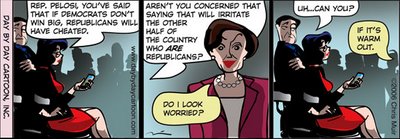
Too accomodating to the other side of the aisle, that is. Were the Republicans too weak? Did they play too "nice"? Did they ignore their base too much? Or was it more than that? Thomas Sowell has some ideas on the subject. Some excerpts from his column yesterday:
The new voter fraud
There is no real question that Democrats are more skilled at politics than the Republicans are. Democrats are more articulate, not to say glib, and they know how to stick together. [...]
I don't know that they are really more articulate... unless emotional posturing counts as "articulation". Some of them can speak well, and many of them can speak fast and LOUD, but WHAT are they articulating?
[...] Democrats know better than to betray their base of supporters -- welfare state beneficiaries, the teachers' unions, environmental zealots, the ACLU and tort lawyers -- the way the elder President Bush betrayed his supporters who relied on his "no new taxes" pledge and the way the current President Bush betrayed them by attempting to create amnesty for millions of illegal immigrants.
Republicans have too often forgotten the old-time admonition to the girl going to a party, to always remember to "dance with the one who brung you." [...]
The interesting thing is, the Democrats "base of supporters" ain't what it used to be. The party has turned HARD left, leaving behind it's more moderate supporters, who became independents or stayed Democrat but vote Republican. Thus, the Republican Party's base has been changing too, trying to absorb disenfranchised Democrats. As a result, I believe the entire political center in America has been dragged further left, and perhaps made the Republicans too accommodating to their opponents on too many issues.
[...] Republicans have too eclectic a collection of beliefs to beat the Democrats on a purely ideological basis. Moreover, the liberal vision is a more attractive vision because it assumes away many of the painful and even brutal aspects of human life, especially the fatal dangers of relying on words when dealing with people who only respect force that is backed up by a willingness to use it.
Facts are the only real antidote to a seductive vision. But facts do not "speak for themselves." Somebody has to articulate those facts and explain their implications. The liberal media will certainly not do it and too often the Republicans do it badly or not at all. [...]
Yes, the facts. Facts that are so painfully obvious to many of us, but that are seldom (or more often, never) spoken about. The Democrat's strident emotionalism too often dominates, drowning out common sense and annoying things like facts. By keeping "debate" on an emotional level, it gives them a lot more manuvering room, and they have learned how to use this playing field to their full advantage. They also work hard at the art of disguise:
[...] Democrats have learned to avoid admitting to being liberals and this year are running a number of moderate candidates.
If these new moderate candidates are elected and give the Democrats control of Congress, that control will be exercised by senior Democrats who will hold leadership positions -- and all of them are liberal extremists, whether people like Nancy Pelosi in the House or Ted Kennedy and John Kerry in the Senate.
Getting people to vote for moderates, in order to put extremists in power, may be the newest and biggest voter fraud.
(bold emphasis mine) But what can you expect from the Party that registers dead people as voters? The ends justifies the means. Holding the power is what is most important.
The "extremists in power" is the saddest part of the election outcome.
Could there be a silver lining in any of this? Perhaps. The Republicans have been too complacent, and the Democrats will now attack them. Perhaps that will force some changes for the better in the Republican Party. I know many Republicans are hoping that will happen.
But it may come at a very dear price. I lived in San Francisco for 23 years, where Nancy Pelosi was my Representative. I think the Democrats can do a lot of damage to many things Republican's care deeply about.

Are too many people making too much of the election results? After all, historically, a case can be made that there is nothing unusual about this result:
A Duel, but Not Decisive
[...] Since the end of World War II, the average loss for a second-term presidency in its sixth year has been 29 House seats and six Senate seats. If you go back to Franklin Roosevelt's second term, the House loss average jumps to 35. Thus a 25/6 House and Senate loss would be about (and slightly below) the historical average. [...]
It may not be unusual historically, but I'm sure that isn't the way the media will spin it. But I have to admit, even I have mixed feelings about the election outcome. The Republicans needed a good kick, and some good may come out of this.
No comments:
Post a Comment